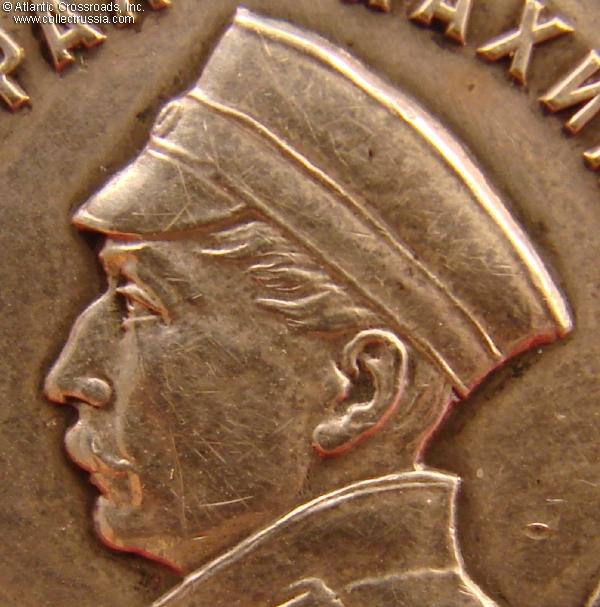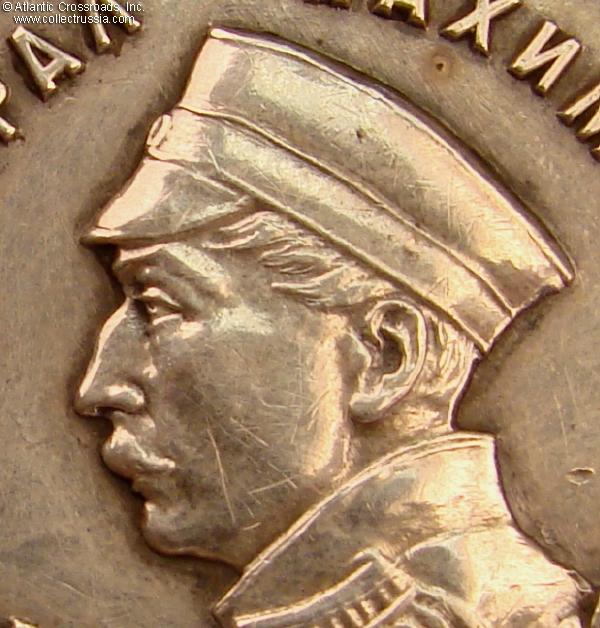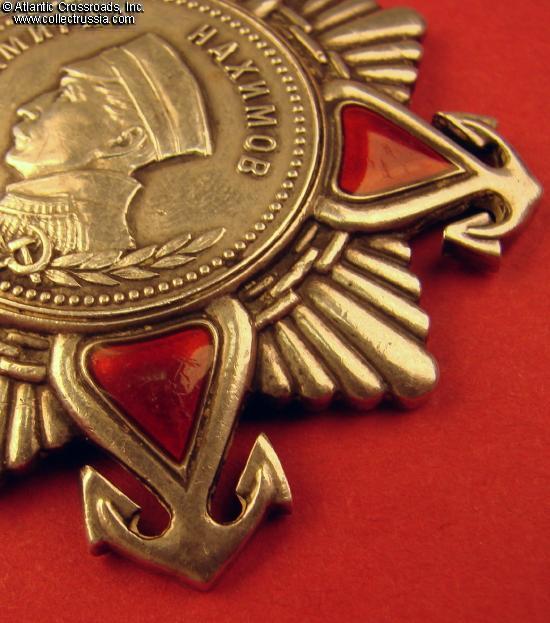
Order of Nakhimov, 2nd class, #162, awarded on 23 August 1945 to Captain 3rd class Petr Vodeneev.
In silver and enamels; measures 56.9 mm in height, 56.6 mm in width; weighs 43.3 g. Classic design of this decoration is highly unusual for a Soviet award. Many consider it to be one of the most beautiful - if not the most beautiful - of all Soviet orders.
In very fine condition. The enamel has scratches (greatly exaggerated in our enlarged photos), but no chips or repairs. The enamel is not dulled by wear and
In silver and enamels; measures 56.9 mm in height, 56.6 mm in width; weighs 43.3 g. Classic design of this decoration is highly unusual for a Soviet award. Many consider it to be one of the most beautiful - if not the most beautiful - of all Soviet orders.
In very fine condition. The enamel has scratches (greatly exaggerated in our enlarged photos), but no chips or repairs. The enamel is not dulled by wear and retains beautiful luster. The center medallion also has scratches and a few minor dings, but is free of heavy wear; the details of the bas-relief portrait are nicely preserved and crisp. There is very attractive patina to silver on both sides, noticeably darker on the reverse where it was less exposed to air. The screw post is of full length, about 12.5 mm. Original silver screw plate is included. To reiterate, this specimen looks magnificent in real life: our huge photos don't do it justice, as they amplify all the imperfections that are barely noticeable to the naked eye.
Petr Vodeneev was born in 1910 in a village of the Nizhniy Novgorod (later Gorky) Region. In November 1931, he enlisted in the Navy as a marine infantryman of the Baltic Fleet. During the following year, he enrolled in a naval machinist school and joined the Communist Party, the latter move opening a path for career advancement as naval political officer. In 1933-35, Vodeneev studied at the Higher Political School at the Dzerzhinsky Academy and upon graduating from it, started his service as submariner after being appointed to the 1st Submarine Brigade of the Baltic Fleet. In 1937 - 38, he served as Politruk (chief political officer) of submarines S-3 and P-2, and by January 1930, rose to command the Political Department of the 4th Submarine Brigade, Baltic Fleet. After briefly serving as a Politruk of the Training Department of the Submarines of the Pacific Fleet in 1940 and receiving further military training himself just before the Patriotic War, Vodeneev was transferred to the Black Sea Fleet with which he took part in the defense of Odessa since the first days of the war.
In October 1941 Vodeneev became Politruk of the 1st Submarine Brigade, Black Sea Fleet. In this capacity he took part in two combat patrols aboard the submarine Shch- 213, an X-series sub of the Shchuka (Pike) Class. During these sorties, the sub clashed with enemy combat vessels and sunk two merchant ships. Although this is not mentioned in the subsequent award recommendation, her first victim was the Turkish schooner Çankaya which the submarine sunk with gunfire on 23 February 1942 (Turkey was not at war with the Soviet Union, but her merchant ships were considered fair game in the effort to stop the flow of supplies to the Axis.) On the following morning, Shch- 213 spotted an old Romanian merchant vessel Struma off the Turkish coast near the Bosphorus strait. Unbeknownst to Vodeneev or the submarine's skipper Denezhko, Struma was carrying nearly 800 Jewish refugees attempting to reach Palestine, then under British mandate. The sub attacked Struma as soon as it came into view easily sinking it with a single torpedo. Tragically, all but one refugee perished as the result of the attack, placing it among the largest civilian maritime disasters of WW2 - and later making the Struma affair a rallying cry for the Zionists in confronting British authorities (the latter were blamed for not allowing entry to the refugees and thus forcing them to stay on a defenseless ship stranded in war zone.)
Sinking two enemy vessels - albeit merchant ships - especially on a single patrol was a very unusual feat for a Soviet submarine crew in the early period of the Patriotic War. For the lack of better options, Soviet subs were used to run dangerous supply missions to the besieged Soviet ports or to bring naval infantry ashore in near suicidal assaults in Crimea. As the naval bases got overrun by the Nazis and their allies, the Soviet subs had to do with limited resources and often put out to sea in far less than perfect condition. As a result, they suffered terrible attrition at the hands of Luftwaffe and Kriegsmarine as well as Romanian Navy, and their victories in the first year of the war were few and far between. This was certainly true for the relatively small and obsolete Shchuka class (the subs of its X series were built in the mid-30s and had a displacement of just over 700 tons with full load.)
Based on information found online and corroborated in the book "Soviet Warships of the Second World War" by Jurg Meister, the Shch-213 was sunk in October 1942 off the coast near the city of Sochi. According to Meister it fell prey to German aircraft, or it may have struck a mine according to another source. Whichever was the case, none of the submarine's crew survived. Luckily for him, Vodeneev was not onboard during her final voyage.
According to the much belated award recommendation submitted in 1945, Vodeneev distinguished himself throughout his service with the 1st Submarine Brigade in the "most difficult days of the Patriotic War". In 1942, he participated with his brigade in the defense of Sevastopol and Novorossiysk by "providing big assistance in delivering supplies to the frontline personnel". As political officer, he set an example of bravery to the sailors of the brigade and instilled in them the spirit of "bravery and dedication to the Motherland."
In August 1942, Vodeneev was appointed deputy political commander to the Department of Harbor Vessels and later, served in the same capacity with the Hydrographic Ships Unit. In January 1944, Vodeneev was transferred to the minesweeper units of the Black Sea and by August 1944 became Commander of the Political Department of the newly created 3rd Minesweeper Brigade. During that time, he was awarded with his first decoration, an Order of the Patriotic War, 1st cl. bestowed in December of that year based on his prior combat service as a submariner.
Vodeneev showed the same dedication to duty as before at his new position. He worked tirelessly training and organizing the personnel and repeatedly demonstrated personal bravery under enemy aerial attacks. He was constantly moving from one boat to another, often spending from 2 weeks to 2 months at sea sweeping the enemy minefields. In May 1945, Vodeneev was recommended for an Order of the Red Banner by the commander of the 3rd Minesweeper Brigade. The decoration was downgraded to Order of the Patriotic War, 2nd cl., bestowed on 25 May.
During the same month, Vodeneev returned to his old profession of a submariner, rejoining the 1st Submarine Brigade (which by that time had earned an honorific title of Sevastopolskaya and an Order of the Red Banner). His new position was Deputy Commander of the Political Department - which may seem as a demotion, but was more likely a result of the temporary downsizing of the navy at the end of the war. Almost immediately, he was once again recommended for an Order of the Red Banner by his superior, Commander of the Political Department of the Brigade, Capt. 3rd cl. Zamyatin. The latter probably served in the same unit as Vodeneev in the early days of the war, judging by the fact that the recommendation was retroactive: it was based entirely on the Vodeneev's achievements in 1941-42. It specifically mentioned that Vodeneev went on two combat missions on the Shch-213 and took part in sinking two enemy vessels. The recommendation also highly praised Vodeneev's performance in the defense of Odessa and Novorossiysk. On 3 August, the recommendation for a Red Banner was approved by the Commander of the 1st Submarine Brigade Rear Admiral Chursin. Someone up the chain of command however changed the recommended award to Order of Nakhimov 2nd cl., which was bestowed upon Vodeneev by a 22 August 1945 decree of the Black Sea Fleet.
Vodeneev remained on active duty in the Soviet submarine fleet after the end of WW2. From March 1946, he had the position of Commander of the Political Department of the Submarine Training Brigade, Northern Baltic Fleet (8th Fleet.) In January 1947, he was recommended for an Order of the Red Star based on 15 years of uninterrupted military service; this petition approved and signed by Admiral Tributs contained Vodeneev's full service record as of the time of the recommendation.
It is worth mentioning that Order of Nakhimov 2nd cl. was awarded only 471 times during its entire history, including two issued to naval units and some that were bestowed but never issued due to the death of the recipient. Out of those actually issued, only 28 were awarded to submariners - an incredibly small portion. A much larger number were issued to naval aviators and officers of surface ships; surprisingly perhaps, a large part of the overall total went to the rear echelon, administrative and support personnel. Additionally, there were a few naval officers awarded with Nakhimov 2nd cl. who had had experience in the submarine fleet prior to the Patriotic War. Careful study of published and Internet records shows however that only 28 recipients of Order of Nakhimov 2nd cl. actively participated in submarine operations at any time during the war (and unlike Vodeneev, not all of them received this decoration specifically for "silent service" - some had been transferred and earned it elsewhere.) In our estimate, chances of another such award to a submariner appearing on the market anytime soon are extremely small.
Research Materials: photocopy of the award
recommendation for the Orders of Nakhimov, 2nd cl.;
Patriotic War, 2nd cl., and Red Star (the latter includes
service record from 1931-1947); photocopy of the relevant
page of the award decree for the Order of the Patriotic War,
1st cl.
$49,000.00 Add to cart





















